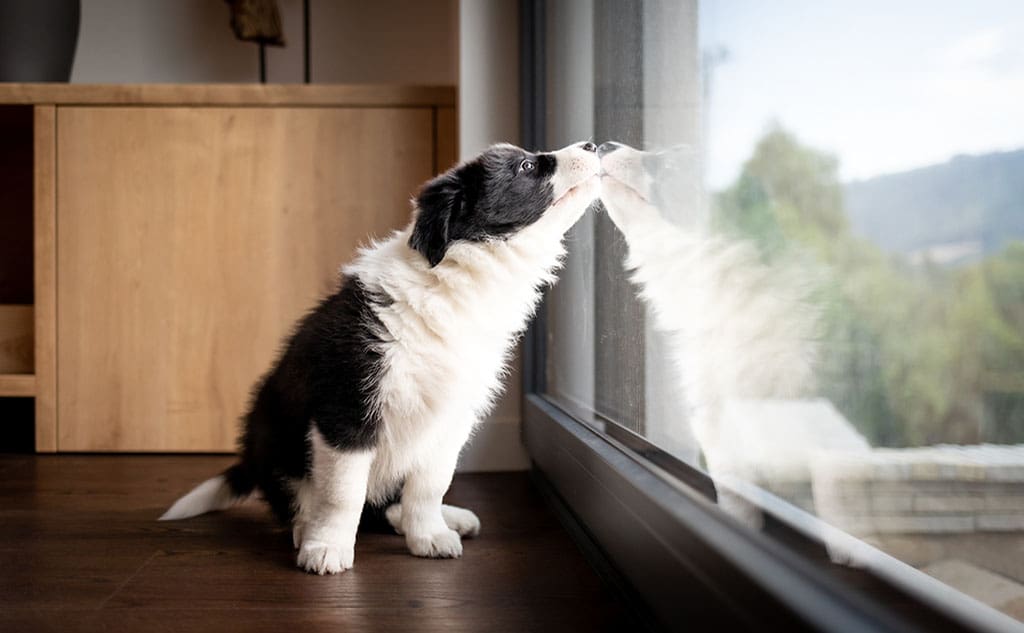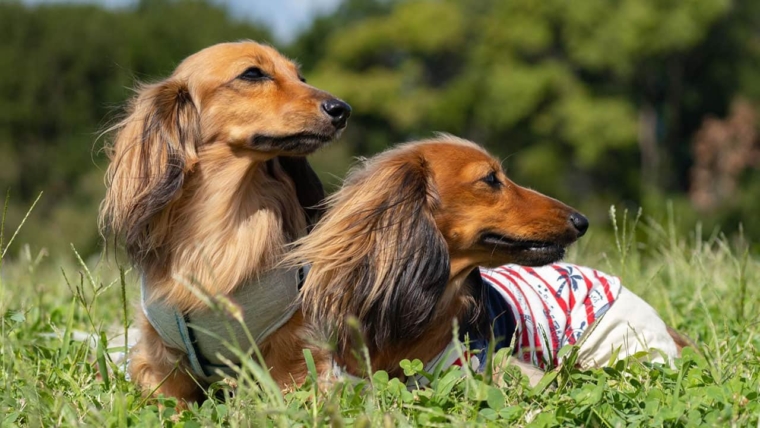
When your puppy becomes enthusiastic, he probably wags his tail and hops about. You may also observe that your dog defecates while stimulated. This is often the outcome of submissive urination, a bodily response. It is perfectly typical for puppies.
It would help if you remembered that your dog views you and himself as group members. He acknowledges that you are the alpha in the pack. It is common for submissive urination to occur as a sign of submission to power. If the conduct is related to dominance, submissive body language and urination are common. In these positions, your puppy’s tail is lowered, and he may roll onto his stomach. He will most likely avoid eye contact.
Submissive urination occurs not only when your puppy is excited but also when it is fearful or apprehensive. It is equally prevalent in male and female canines. Typically, pups outgrow this behavior, but it is not uncommon for adult dogs to urinate inappropriately if they are reprimanded or scared by a loud noise.
When should you be concerned about submissive urination? Let’s examine a few instances where it may signal a condition that warrants worry.
Why Do Puppies Pee When Excited or Scared?
Medical problems may cause inappropriate urination.
If you suspect that your puppy’s frequent urine may not be due to basic submissive behavior, there are several medical causes. You will likely observe that your puppy’s urination is not intentional, but you should consider whether he can manage it.
If you believe that your puppy cannot control his urination, this is known as incontinence, and it may be a sign of a health issue. If your puppy appears to have lost control of his bladder, he may have a weak bladder or an infection of the urinary system (UTI).
UTIs are prevalent; therefore, if you observe your puppy urinating frequently and displaying a lack of bladder control, you should likely take him to the veterinarian to rule out a medical explanation. UTIs can be effectively treated with medications.
If you’ve recently altered your puppy’s diet, it’s also likely that his behavior results from a shift in potty habits. Nonetheless, it is better to be cautious than sorry. Considering that you and he are great friends, you wouldn’t want anything to happen to him.
Submissive Urination: A Behavioral Issue
Peeing submissively is a typical component of a puppy’s behavior. They are learning their position in the group and demonstrating that they understand it. However, if puppies do not know to control their urge to urinate, it can become a behavioral concern as they age.
Peeing submissively is typical among puppies younger than 12 weeks of age. Naturally, they are more susceptible at a young age, and puppies typically outgrow excessive urination. As you execute proper housetraining, kids develop self-control and can contain their urine.
If your dog is older than 12 weeks or an adult dog and continues to urinate submissively, this may result from insufficient housetraining. They may not yet understand when and where it is appropriate to urinate. Adopted dogs may exhibit this behavior more frequently since they have not yet learned the house rules.
Submissive peeing is often a sign of insecurity.
If you fail to adopt and finish effective housetraining, your puppy may develop the behavior of urinating submissively when feeling insecure. It is also possible that your best buddy has been improperly punished in the past, and they fear that this will occur again.
Another factor contributing to insecurity is separation anxiety. This can also lead to submissive urination. Your puppy may defecate due to the emotional anguish he experiences when he sees you leaving.
When you return home, he can suffer enthusiastic urination. This is distinct from submissive urination, but it is nonetheless the outcome of your puppy’s anxiety regarding your departure.
Urine marking
Another possible urination-related behavioral concern is pee marking. It is essential to emphasize that this is not the same as submissive urination. In cases of urine marking, your puppy does not urinate out of submission. In reality, he is urinating to assert his supremacy.
Okay, so you’ve determined that your puppy’s inappropriate urinating is a behavioral issue, not a medical one; what should you do? This is where puppy training comes in handy.
Dog Excited Pee Prevention
You must know to prevent your dog from urinating when aroused.
Consult Your Vet
Consult your veterinarian as the initial step in aiding your puppy. A range of medical conditions, including bladder infections and other urinary tract disorders, can cause urinary accidents. The first step in assisting your puppy in staying dry is to rule out any underlying medical conditions. Your veterinarian can also answer any questions you have about nutrition and supplements.
Supplements To Support Urinary Tract Health
If your puppy is healthy, you can try giving them bladder-strengthening vitamins. The most prevalent supplement is cranberry extract, which can lessen the acidity of your puppy’s urine and make it less likely to urinate when highly stimulated. Other supplements, such as Cranberry, D-Mannose, Vitamin B6, omega-3 fatty acids, and L-tryptophan, can also strengthen the bladder.
Schedule Potty Breaks Before the Excitement
Timing your puppy’s bathroom breaks might lessen the likelihood of an accident. Before you anticipate your puppy to become unduly enthusiastic, take them outside for a bathroom break. This will ensure that your puppy’s bladder is not complete when stimulated.
Positive Reinforcement
Positive reinforcement can be an effective method for teaching your dog to remain dry during joyful periods. Reward your dog with a treat or other positive reinforcement whenever it can dry. This will teach your puppy that staying dry is the desired habit.
Be Patient
It is vital to go slowly when interacting with a highly excited puppy. Do not expect them to stop urinating immediately. Instead, concentrate on teaching them to remain dry for longer and longer intervals.
Exercise Prior Excitement
Exercising your puppy before they grow excited might help them maintain control of their bladder and composure. This can help lessen the likelihood of an accident. Before placing your dog in a setting where they may become highly enthusiastic, take them for a walk, play fetch, or engage in any other type of physical activity.
Desensitize The Puppy
Your puppy can learn to maintain composure and self-control by becoming desensitized to objects and situations that thrill it. Start by placing your dog in the presence of the stimulus when they are calm and in control of their bladder. Gradually raise the intensity of the circumstance until your dog can remain calm and dry even when highly stimulated.
Use a Dog Diaper
Try using a puppy diaper if your dog’s accidents are causing substantial damage to your house. Dog diapers can help contain any mishaps and prevent damage to your home. They may not be the most desirable alternative, but they can save the lives of pet owners looking for a solution.
Crate Training
Crate training is an excellent strategy to ensure your puppy remains dry during times of excitement. It is essential to properly crate-train your puppy and never use the crate as a punishment. If your puppy is crate-trained and becomes extremely excited, you can place them in the crate until they calm down. This can aid in the prevention of accidents.
Conclusion
The issue of submissive urinating is a typical one for pet owners. Occasionally, it is merely an act of excitement urinating and not a true sign of submissiveness, but you must ensure that your puppy outgrows this behavior.
If you have an adult dog or a puppy that does not appear to be outgrowing the problem, it may be time to rule out a health issue and then begin dog training to address it.
Proper socialization and positive reinforcement can assist your dog in overcoming any emotions of insecurity when you leave or when he meets new people or pets. As with any canine behavior, recognizing it is essential for resolving potential behavioral difficulties. In addition to ensuring that your dog is physically healthy, you also want to ensure that he is happy!


